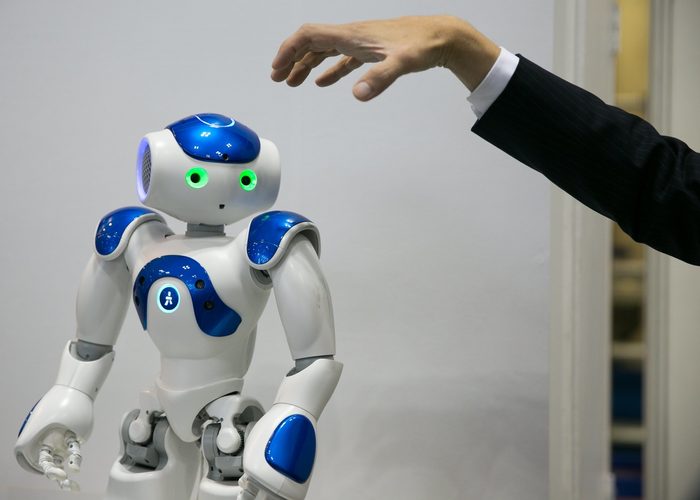Hello, I'm Michael Kende from the Graduate Institute in Geneva and today we're covering Geneva's growing role as a hub for internet governance. As the internet has continued to grow and permeate our lives, so have concerns surrounding issues such as cybersecurity and online rights. Good governance requires cooperation between a variety of stakeholders, and below I explain why this is well suited to the strengths of International Geneva. |
|
Anticipatory reads by GESDA
|
|

A 'Third AI' robot is seen on display during the Artifical Intelligence Exhibition and Conference (AI Expo) in Tokyo, Japan, 28 June 2017.
|
|
Culture, in all its forms,
but perhaps even more so through literature, is one of the things that defines us as humans. Many of you might have bumped into this Guardian article, showing how GPT-3, a new language generator created by AI firm OpenAI, wrote an entire opinion article (see below). It even starts with this sentence: “I am not a human. I am a robot.”
Fewer might have encountered this other text – this time written by a human – published in the MIT Technology Review, which describes how another virtual AI robot, called Diffbot, learns by reading the entire web, nonstop!
Some might jokingly say that letting Diffbot continuously scan the hundreds of articles GPT-3 would write might be a funny way to observe AIs in (inter)action. More than this, however, the question is: will these new AI literature create a "digital culture" just as Proust, Shakespear or Goethe have shared their part in crafting human culture?
- Olivier Dessibourg, GESDA
(EN)
|
|
Ingredients for a quantum future.
Always wanted to know how this technology will transform our society? In a series of essays, three quantum-technology leaders in the US spell out the requirements for a strong quantum future.
Physics (EN)
|
|
The great carbon vault.
Industrial waste can combat climate change by turning carbon dioxide into stone: is this the clever way to address two environmental problems at once?
Science (EN)
|
|
A revolutionary way to cool electronic chips.
Miniaturized electronic devices generate a lot of heat, which must be dissipated to maintain performance. A microfluidic system, developed at EPFL, designed to be an integral part of a microchip demonstrates exceptional cooling performance.
Nature (EN)
|
|
Brain stimulation reduces dyslexia deficits.
Using a non-invasive electrical stimulation technique capable of synchronizing neural activity at the stimulation frequency, University of Geneva scientists showed that phonological deficits and reading accuracy could be improved in adults with dyslexia.
Eurekalert (EN)
|

This selection is proposed by the Geneva Science and Diplomacy Anticipator
GESDA, working on
anticipating cutting-edge science and technological advances to develop innovative and inclusive
solutions for the
benefit of the planet and its inhabitants.
|
|
GESDA, and the reason for anticipation
|
|
|
Humanity, now more than ever,
is facing global challenges (especially with regards to the Covid-19 crisis), putting people and the planet under stress and in great uncertainty. Simultaneously, the world is experiencing breakthroughs in science and technology at an unprecedented pace, which are sometimes hard to grasp. Anticipation, therefore, is key to build the future with the aim of fully exploiting this scientific potential for the well-being and inclusive development of all. The Geneva Science and Diplomacy Anticipator was founded in Geneva in 2019 to tackle this issue.
GESDA's ambition is to first anticipate and identify these cutting-edge advances in science and technology throughout various domains (Quantum revolution & advanced AI, Human augmentation, Ecoregeneration and Geoengineering, Science and Diplomacy). Based on this panoramic scientific outlook, it will translate potential leaps in science and tech into tools that can bring effective and socially-inclusive solutions to emerging challenges. Most importantly, this process will be achieved not only by scientists or technologists, but will include actors of various professional origins and mindsets (from diplomacy, philanthropy, industry, citizens to youth).
|
|
|
GS news is a new media project covering the world of international cooperation and development. Don’t hesitate to forward our newsletter!
Have a good day!
|

|
|
Avenue du Bouchet 2
1209 Genève
Suisse
|
|
|
| |









